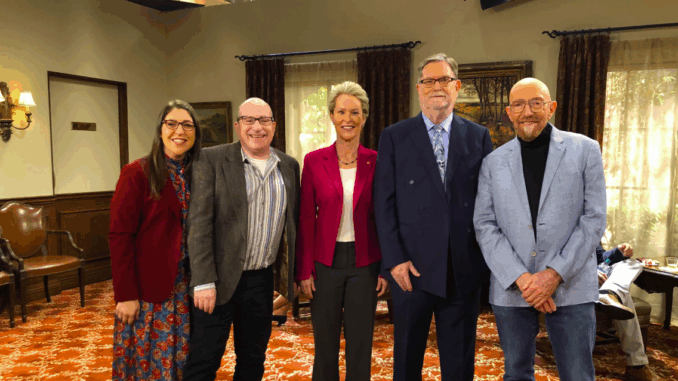
When The Big Bang Theory ended its 12-season run, the moment fans had long anticipated finally arrived—Sheldon Cooper, the brilliant but socially oblivious physicist, won the Nobel Prize. But while the world applauded his scientific achievement, those behind the scenes and millions of viewers knew the real reward wasn’t the medal—it was Sheldon’s evolution into a man capable of empathy.
In Jessica Radloff’s definitive oral history book The Big Bang Theory: The Definitive, Inside Story, Jim Parsons, who portrayed Sheldon, reflected on that iconic series finale and what it truly meant. According to him, Sheldon’s real arc wasn’t defined by equations or experiments—it was emotional. “It was everything I ever wanted for him,” Parsons said, recalling how he wept the first time he read Sheldon’s Nobel acceptance speech.
That moment, broadcast from Stockholm’s grand Nobel stage, wasn’t about science—it was about love, growth, and gratitude. Instead of using his time in the spotlight to boast, Sheldon surprised everyone—both characters and fans—by delivering a heartfelt, unscripted tribute to the people who had stood by him: Leonard, Penny, Amy, Howard, Bernadette, and Raj.
“Sheldon always needed the world to revolve around him. That night, it didn’t,” said executive producer Steve Molaro. And that, more than anything, was the writers’ endgame. After more than a decade of watching Sheldon struggle with empathy, social cues, and emotional vulnerability, the team knew that real closure wouldn’t come from a trophy—it would come from a gesture of humility and connection.
Chuck Lorre, co-creator of the show, explained the delicate balance that made this moment so powerful: “The comedy worked because Sheldon never changed overnight. But he did change.” And therein lies the brilliance of the character’s evolution. It was slow, sometimes exasperating, often hilarious—but always real.
:max_bytes(150000):strip_icc():focal(749x0:751x2)/jim-parsons-tout-061724-3f01ff10516448ef82176ee41c820ad0.jpg)
Fans remember the Sheldon of early seasons: the man who labeled hugging as a social disease, who made detailed roommate agreements with 31 clauses on bathroom schedules, who refused to understand sarcasm, and who panicked at the idea of change. But by the end, he was married, slightly more flexible, and willing to put others first—even in a moment where the whole world was looking at him.
For twelve years, audiences watched Sheldon take microscopic steps toward emotional maturity. He struggled, resisted, learned, and stumbled. But he kept moving. In many ways, his final speech was not just the culmination of his growth—it was a tribute to the journey of friendship, acceptance, and vulnerability that had quietly shaped him over time.
And as Jim Parsons noted, that growth mattered more than any scientific honor. It mattered because it showed that even the most rigid, guarded individuals are capable of opening their hearts. That anyone—no matter how stubborn or scared—can learn to say, “Thank you.”
In the end, Sheldon Cooper didn’t just win the Nobel Prize.
He won us over.